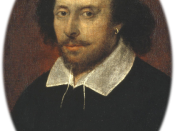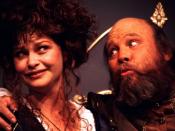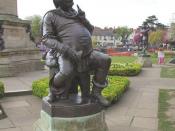Falstaff's Role in I Henry IV
In Shakespearean histories, there is always one individual who influences the major character and considerably advances the plot. In I Henry IV by William Shakespeare, Falstaff is such a character. Sir John Falstaff is perhaps the most complex comic character ever invented. He carries a dignified presence in the mind's eye; and in him, we recognize our internal admiration and jealousy of the rebellious dual personality that we all secretly wish for. The multi-faceted Falstaff, in comic revolt against law and order, in his role as father figure to Prince Hal, and ultimately, in his natural ability to discern and adapt to any situation, emerges as the most complex and paradoxical character in drama.
Falstaff is habitually aware that Hal will one day become king, and when that happens, robbers will be honored in England by "Let[ting] us be indulgence Diana's foresters, gentlemen of the shade, monions of the moon; and let[ting] men say we be men of good government, being governed as the sea is, by our novle and chaste mistress the moon, under whose countenance we steal" (I, ii, 18-24).
Falstaff's final dismissal of law and order culminates with a comic plea to the prince, urging him to have nothing to do with "...old father antic the law? Do not thou, when thou art King, hang a thief" (I, ii, 47-58). We see a similar epithet in the next act, "send him packing" (II, iv, 301), in which Falstaff again denounces responsibility, law, and order. Despite his lack of care for order and responsibility, the rebel dormant in readers applauds Falstaff's defiance of the establishment of his defense. Falstaff's life in the tavern creates a mirror image of the upheaval that exists in the world of the palace. The dramatic switch between...


